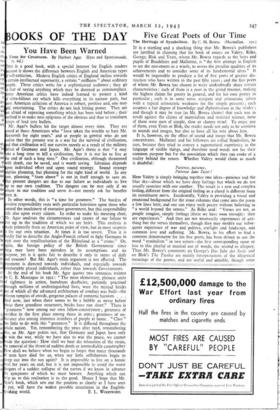OKS OF THE DAY
You Have Been Warned is is a good book, with a special interest for English readers . . use it shows the difference between English and American types self-criticism. Modern English critics of England incline towards certain intellectual superiority, a certain " sniffiness " about ordinary Tic. These critics write for a sophisticated audience ; they go fear of saying anything which may be damned as commonplace.
• e American critics have indeed learned to project a kind ultra-bilious ray which kills everything in its narrow path, but II•St American criticism of America is robust, positive and, one may id, entertaining. The critics do not lack hitting power. They are it afraid of repeating something which has been said before ; their ethod is to make neat epigrams of the obvious and thus to transform umps of lead into bullets.
Mr. Agar's bullets hit the target almost every time. They are • .ed at those Americans who "have taken the trouble to hate Mr. .• isevelt for eight years," and at people in general who do not ealise that the present war is a war for the survival of civilisation, id that civilisation will not survive merely as a result of the military
• eat of Germany and Japan. Mr. Agar's thesis is that "it may alte a long time to kill a civilisation, but it is our lot to live at he end of such a long time." Our civilisation, although threatened ith death, can be saved, and is worth saving. Salvation depends pon individual effort and upon sound strategy. Sound strategy
plies planning, but planning for the right kind of world. In any .se, planning "from above" is not in itself enough to save us. Our present dangers are due to our failure as individuals to live p to our own tradition. The dangers can be met only if we etum to our tradition and serve it—not merely ask for benefits corn it.
In other words, this is "a time for greatness." The burden of • Isi 've responsibility rests with particular heaviness upon those who ontrol the machinery of executive government, but this responsibility ails also upon every citizen. In order to make his meaning dear,
Ir. Agar analyses the circumstances and causes of our failure 'to V25 iVe up to the tradition of which we are heirs. This analysis is a ade primarily from an American point of view, but in most respects nt t fits our own situation. At times it is too severe. Thus it is cal ardly fair to describe the Anglo-French refusal to fight Germany in -he 936 over the remilitarisation of the Rhineland as a "crime." Or, of gain, the foreign policy of the British Government since XI 934 may have been mistaken in its assumptions and its are iurposc, yet is it quite fair to describe it only in terms of drift de. d evasion? But Mr. Agar's main argument is not affected_ The fly gument is directed towards individuals, and especially towards uo • fortably placed individuals, rather than towards Governments. ed. At the end of his book Mr. Agar quotes two sentences written St. ly C. E. Montague in 1921: "The most elementary, plainest units he If rightness in action, humdrum decencies, patiently practised eel trough millions of undistinguished lives, were the myriad bricks
t of which all the advanced architecture of conduct was built—the
od templei of creeds, gorgeous palaces of romantic heroism . . .
• d now, just when there seems to be a babble as never before bout these grandiose structures, bricks have run short." There is greatness" now among our own fellow-countrymen ; greatness of .1y .acrifice in the first place among those in arms ; greatness of en- d 'urance also among immense numbers of people at home. " Class " tie s little to do with this "greatness." It is diffused throughout the ale hole nation. Yet, remembering the years after 1918, remembering eg so, as Mr. Agar points out, that Germany and Japan have only us o win the war, while we have also to win the peace we cannot ade the question : How shall we bear the relaxation Of the strain, ss. c removal of the threat of sudden death or irremediable catastrophe?
rid ow shall we behave when we begin to forget that many thousands
is. men have died for us, when our little selfishnesses begin to
n 'eep out into the sun again? It is impossible to live on a heroic rd eye' for years on end, but it is not impossible to avoid the worst n • ngers of a sudden collapse of the nerves if we know in advance e symptoms of which we must beware. Anything which can
lp us to this realisation is to the good. Hence I hope that Mr. gar's book, which sets out the position as clearly as I have seen put, will have ex widest possible circulation in the English-
g. 'tee ttle eat
th
to get
en led illy of ley er,
the nd of ch 'sh ted the the eel ent


























 Previous page
Previous page